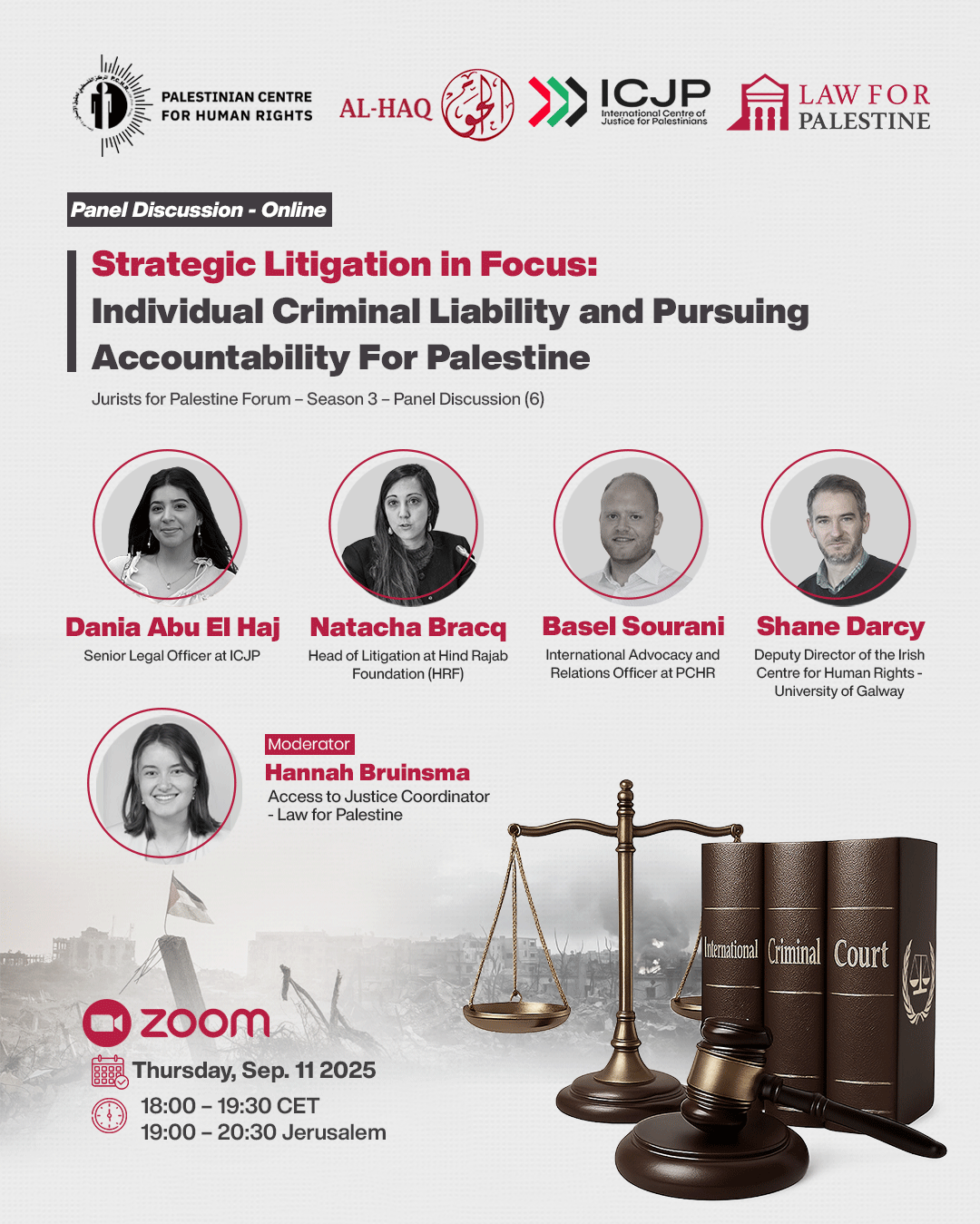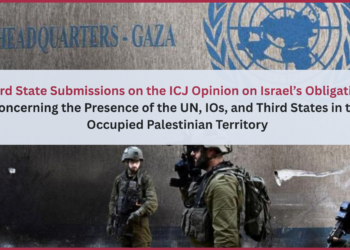Webinar | Strategic Litigation in Focus: Individual Criminal Liability and Pursuing Accountability For Palestine
Jurists for Palestine Forum – Season 3 – Panel Discussion (6)
Main Information:
-
- Date: Thursday, September 11 2025
- Time: 18:00 – 19:30 CET || 19:00 – 20:30 Jerusalem
- Location: Online via Zoom and Live on YouTube.
- Language: The webinar will be conducted in English. Simultaneous translation into Arabic will be available.
Registration is required: You can register here.
Background:
The humanitarian situation in Gaza continues to deteriorate amid Israel’s escalating military operations on Gaza city, leading to the forced displacement of thousands and exacerbating the starvation of the civilian population. As the genocidal war on Gaza approaches its 2nd year mark, the death toll has reached a staggering 61,722 fatalities, including 1,859 who were killed while trying to access food supplies and more than 13,594 injuries since 27 May 2025. Additionally, as of 22 August 2025, The Integrated Food Security Phase Classification (IPC) Famine Review Committee (FRC) has declared famine in Gaza Governorate and a projection of it spreading across other parts of the Gaza Strip. Reporting on the ongoing atrocities has also come under sustained attack with at least 192 journalists deliberately targeted and killed by Israeli Occupation forces. On August 10, Israeli forces killed six journalists and two others were injured by a targeted strike in Gaza City, prompting international condemnations.
As the genocide in Gaza continues, increased violence perpetrated by settlers and Israeli occupying forces in the West Bank persists. On August 20, Israel gave final approval for a new settlement project in the area E1, an open tract of land east of Jerusalem, that would effectively divide the territory in two, further complicating the prospects for a two-state solution.
Against this backdrop of unprecedented war crimes, crimes against humanity, genocide, and other grave breaches of international law, civil society groups have continued to engage in strategic litigation efforts to seek justice and accountability for crimes, whether perpetrated directly or aided and abetted by third states, corporations, or individuals in the Occupied Palestinian Territory (OPT). Strategic litigation, also known as impact litigation, is a legal strategy used to promote human rights, enforce international law, and bring about broader social change through policy, legislation and practice. This kind of litigation aims to clarify, protect, and fulfill rights, and can have a broader and lasting impact at the national, regional or international level.
The legal framework established by the Geneva Conventions, Genocide Convention and the Rome Statute of the International Criminal Court (ICC) provides for establishing individual criminal liability for committing, participating in, or aiding acts of aggression and other breaches of international law that sustain the unlawful occupation. As an international judicial body, the ICC was intended for pursuing individual perpetrators of international crimes that “deeply shock the conscience of humanity”.
On November 21, 2024, the Court issued arrest warrants for Israeli Prime Minister Benjamin Netanyahu and former Defense Minister Yoav Gallant, charging them with crimes including starvation, attacks on civilians, murder, and persecution in Gaza. While the atrocities taking place in Gaza, and the individuals involved at the level of Israeli leadership, go far beyond the limited scope of the current arrest warrants, the Court has remained effectively paralyzed in issuing further warrants, particularly amid mounting pressure and escalating U.S. sanctions
In October 2024, the Hind Rajab Foundation filed a submission with the ICC accusing 1,000 Israeli soldiers of crimes in Gaza, often relying on the soldiers’ social media posts documenting their crimes. In March 2024, the International Centre of Justice for Palestinians (ICJP) launched the Global 195 Coalition, uniting lawyers across more than 20 jurisdictions to pursue accountability for alleged war crimes in Gaza. Over 80 lawyers are preparing complaints against suspected perpetrators of Israeli military operations present within their jurisdictions. In December 2023, US-based DAWN filed its first submission to the ICC prosecutor, implicating 40 Israeli commanders for their role in attacks on civilians, starvation, and blocking aid. As early as in March 2024, Law for Palestine submitted, with a broad endorsement of international partners, a communication to the ICC outlining genocidal intent of the Israeli war cabinet members. Utilising the principle of universal jurisdiction, there have been efforts to pursue justice in national legal systems as well. These cases include an investigation by Belgian authorities in October 2024 into the conduct of a Belgian-Israeli citizen in the Israel forces.
Given these developments, establishing individual criminal liability for war crimes, crimes against humanity and genocide plays a crucial role in the pursuit of justice and accountability committed in the entirety of the oPt, including in the West Bank where an Israeli policy of illegal settlement expansion is underway. According to the ICJ Advisory Opinion of July 2024, this settlement policy is considered part of Israel’s policies and practices that separates between the Palestinian population and the settlers, imposing a system of discrimination both juridical and physical.
The webinar will address the following questions: what are the avenues available on the international and national levels to establish individual criminal liability? How are perpetrators identified, arrested, charged and prosecuted? What are the legal and political consequences of utilising this tool for legal accountability for war crimes and other human rights atrocities?
In light of this, Law for Palestine in collaboration with the International Centre of Justice for Palestinians, the Palestinian Centre for Human Rights (PCHR) and Al-Haq is organising the second panel of a two-part online discussion to shed light on strategic litigation efforts in the context of atrocities occurring in Palestine. This session examines strategic litigation efforts led by civil society groups, focusing on their approaches to holding individual perpetrators accountable through the establishment of criminal liability whether through submissions to the ICC or in national jurisdictions. The session will focus specifically on litigation in relation to crimes perpetrated in the West Bank taking into consideration the 2024 ICJ Advisory Opinion and other relevant sources of international law.
Speakers:
- Dania Abu El Haj, Senior Legal Officer at ICJP.
- Natacha Bracq, Head of Litigation at Hind Rajab Foundation (HRF)
- Basel Sourani, International Advocacy and Relations Officer at Palestinian Centre for Human Rights (PCHR)
- Shane Darcy, Deputy Director of the Irish Centre for Human Rights in the School of Law at University of Galway
Moderator:
- Hannah Bruinsma, Access to Justice Coordinator, Law for Palestine
To participate in this discussion, you need to register, click here.





